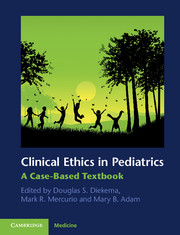Book contents
- Frontmatter
- Contents
- Contributors
- Preface
- Section 1 Core issues in clinical pediatric ethics
- Pediatric decision-making: informed consent, parental permission, and child assent
- 2 Pediatric decision-making: adolescent patients
- 3 Parental refusals of recommended medical interventions
- 4 Adolescent confidentiality
- 5 Refusals of treatment in adolescents and young adults
- 6 Family beliefs and the medical care of children
- 7 Fidelity and truthfulness in the pediatric setting: withholding information from children and adolescents
- 8 Fidelity and truthfulness: disclosure of errors
- 9 Requests for “non-therapeutic” interventions in children: male circumcision
- Section 2 Ethical issues at the beginning of life: perinatology and neonatology
- Section 3 When a child dies: ethical issues at the end of life
- Section 4 Ethical issues posed by advances in medical technology and science
- Section 5 Children, public health, and justice
- Section 6 Special topics in pediatric ethics
- Index
- References
5 - Refusals of treatment in adolescents and young adults
from Section 1 - Core issues in clinical pediatric ethics
Published online by Cambridge University Press: 07 October 2011
- Frontmatter
- Contents
- Contributors
- Preface
- Section 1 Core issues in clinical pediatric ethics
- Pediatric decision-making: informed consent, parental permission, and child assent
- 2 Pediatric decision-making: adolescent patients
- 3 Parental refusals of recommended medical interventions
- 4 Adolescent confidentiality
- 5 Refusals of treatment in adolescents and young adults
- 6 Family beliefs and the medical care of children
- 7 Fidelity and truthfulness in the pediatric setting: withholding information from children and adolescents
- 8 Fidelity and truthfulness: disclosure of errors
- 9 Requests for “non-therapeutic” interventions in children: male circumcision
- Section 2 Ethical issues at the beginning of life: perinatology and neonatology
- Section 3 When a child dies: ethical issues at the end of life
- Section 4 Ethical issues posed by advances in medical technology and science
- Section 5 Children, public health, and justice
- Section 6 Special topics in pediatric ethics
- Index
- References
Summary
Case narrative
Kristin is a 17-year-old admitted through the emergency department of a children’s hospital, where she presented with severe dehydration and abdominal pain. Her mother accompanied her to the hospital, and her father soon joined them. Kristin has a history of multiple hospital admissions for episodes of severe weight loss and dehydration. She was assigned to the general adolescent medicine service, and diagnosed with acute inflammation of the pancreas and gallbladder secondary to the diagnosis of anorexia nervosa. When asked about her daughter’s medical history, Kristin’s mother denied her daughter had an eating disorder. Her father explained that Kristin had always been a very driven gymnast. With a height of 5′6″ (168 cm), Kristin’s weight upon admission was 79 pounds (36 kg).
Over the next week, as members of the adolescent team tried to engage Kristin directly in a discussion of her health and a treatment plan, Kristin, despite being alert and intelligent, grew agitated and angry in response to any mention of an eating disorder or anorexia, even threatening to “fire” certain providers who upset her. Kristin’s mother largely stood by and asked team members not to upset her daughter. While Kristin had initially allowed nasojejunal feeds and line placement for intravenous (IV) fluids, she later questioned the nurse suspiciously when she hung a new IV bag, asking, “How many calories are in that stuff?” She demanded that the line be removed. The nurse managed to persuade Kristin that the only way she would get better was through IV rehydration and nutrition. The patient acquiesced and did not attempt to remove the line.
- Type
- Chapter
- Information
- Clinical Ethics in PediatricsA Case-Based Textbook, pp. 23 - 26Publisher: Cambridge University PressPrint publication year: 2011
References
- 2
- Cited by

